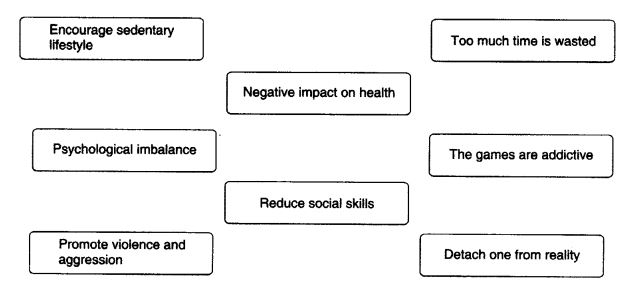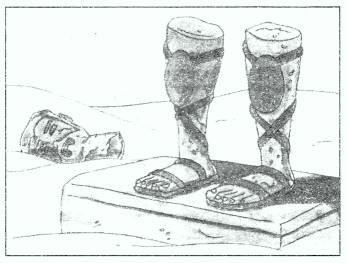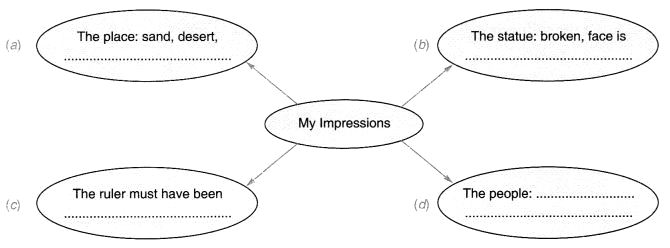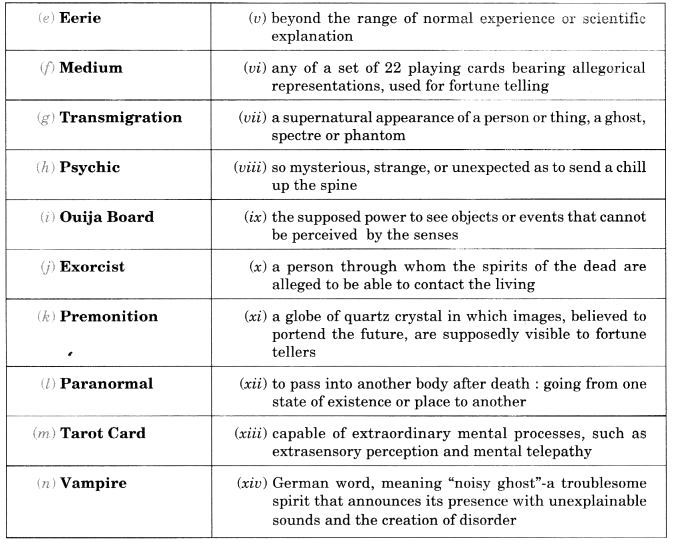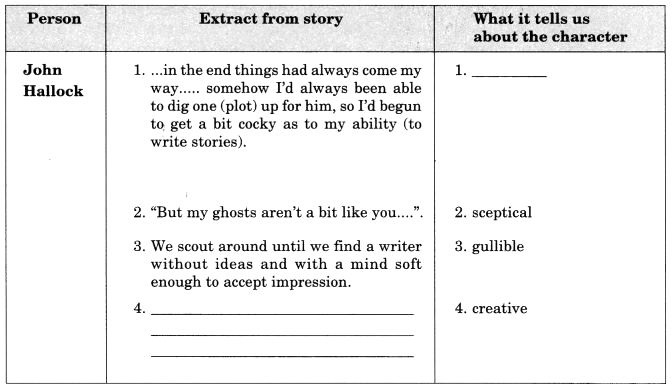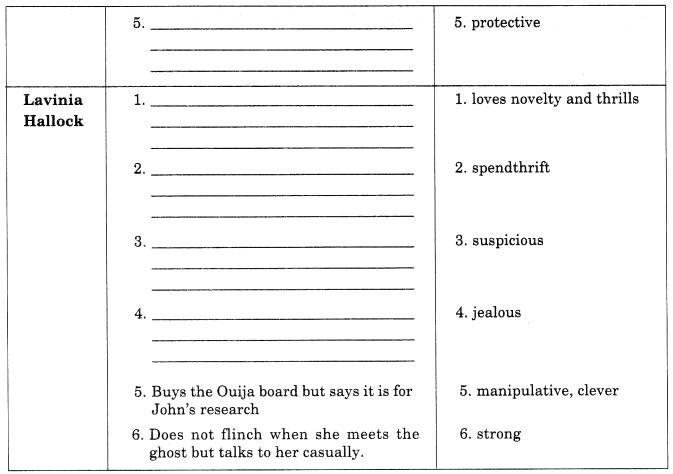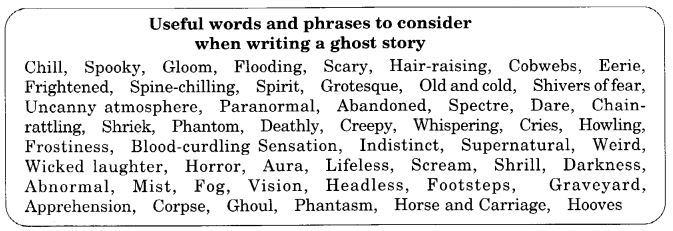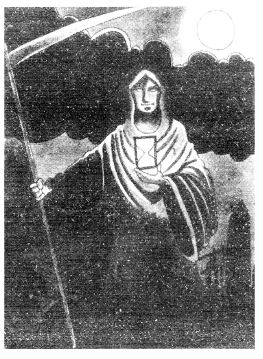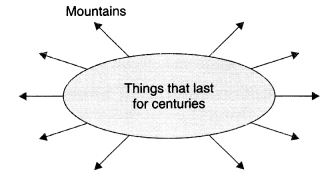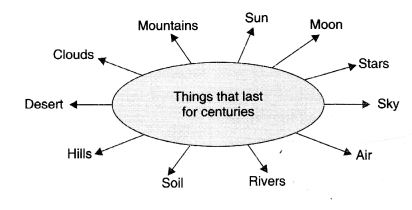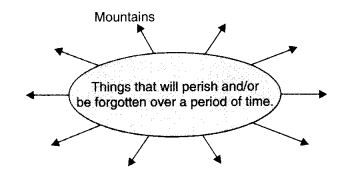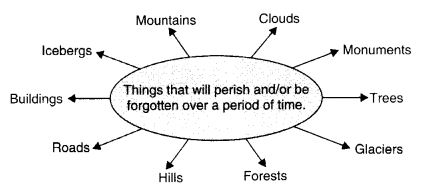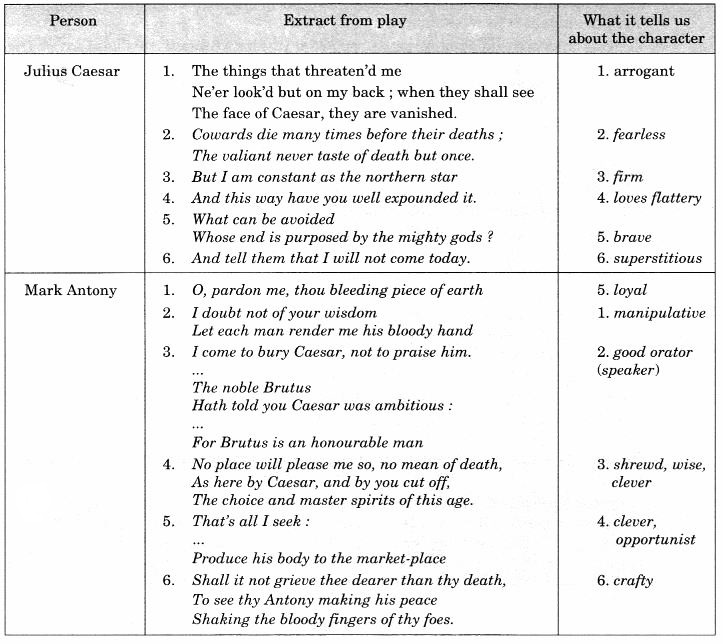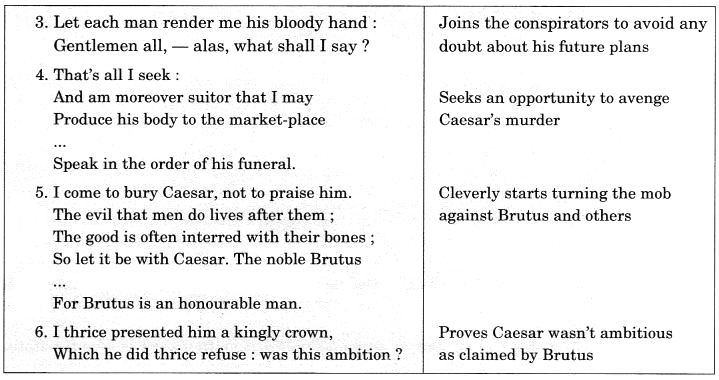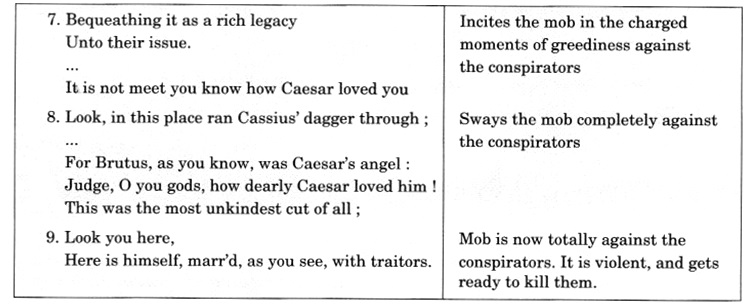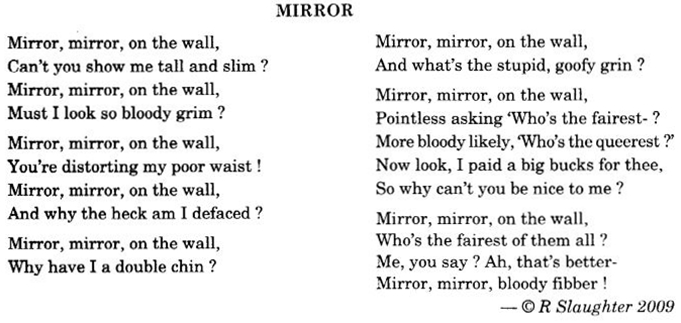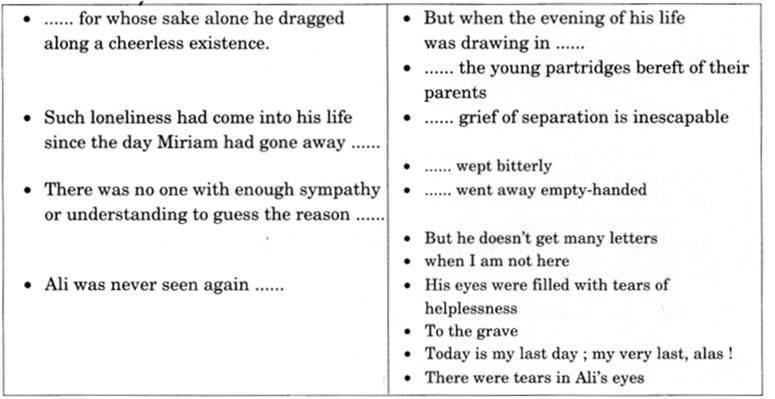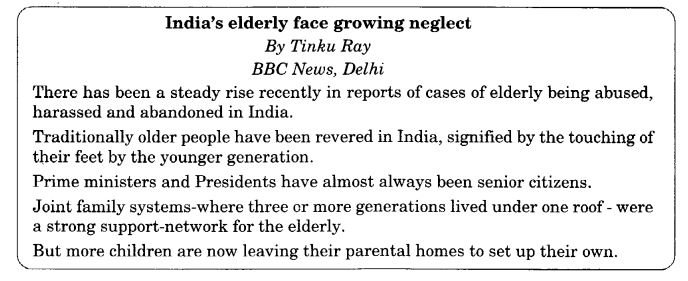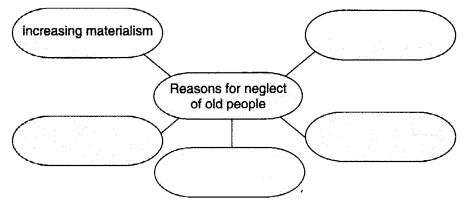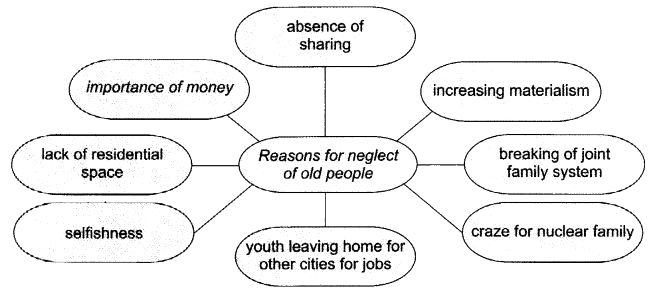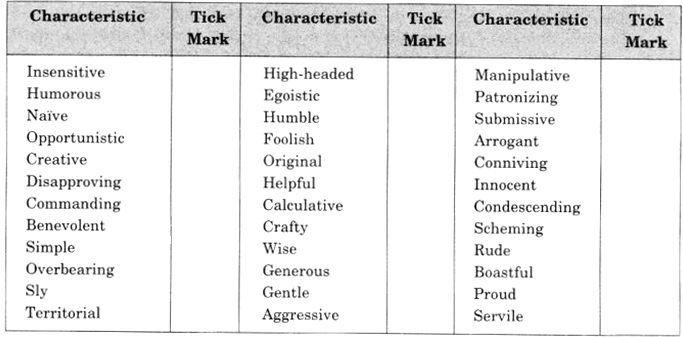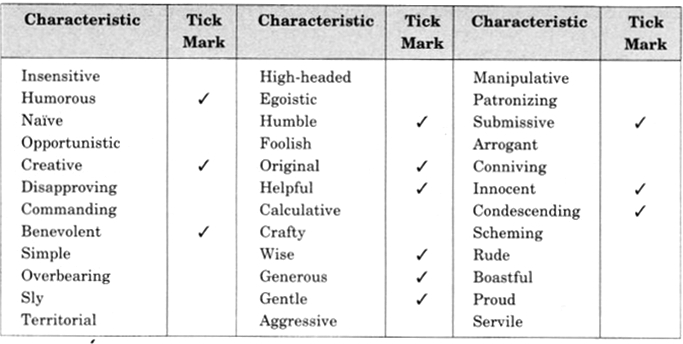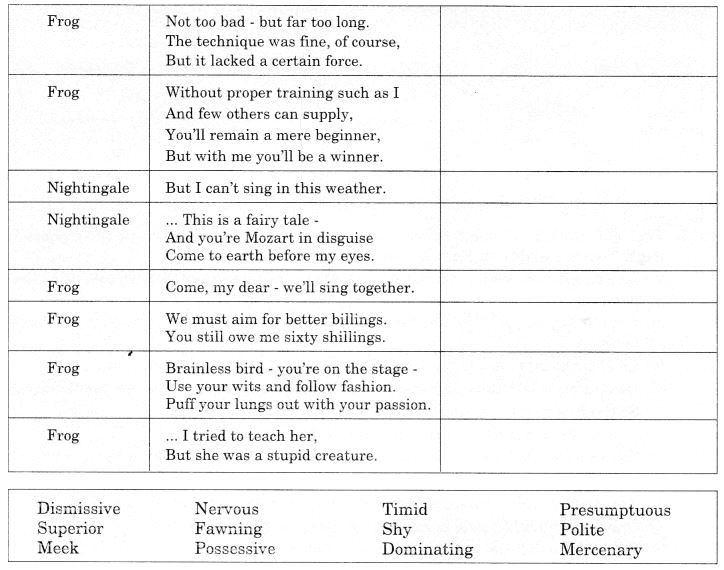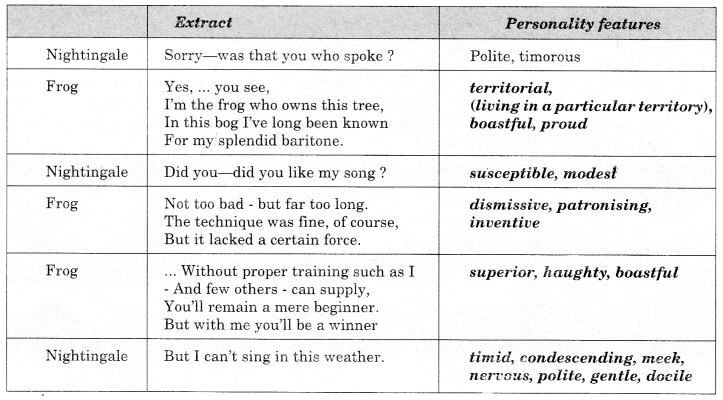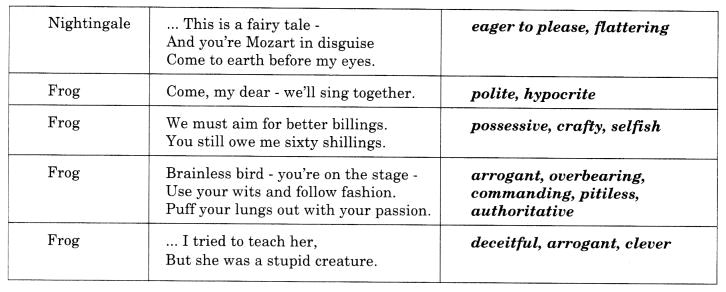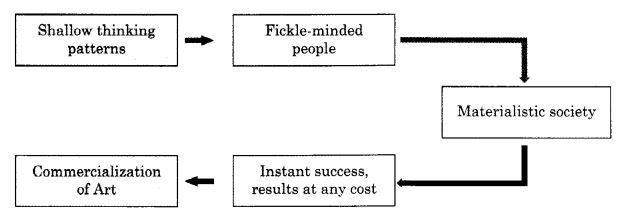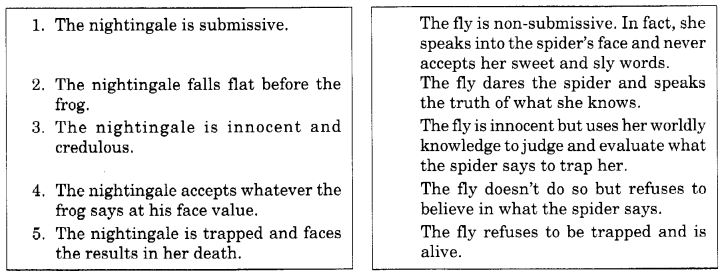NCERT Solutions for Class 10 English Literature Chapter 11 The Rime of the Ancient Mariner are part of NCERT Solutions for Class 10 English. Here we have given NCERT Solutions for Class 10 English Literature Chapter 11 The Rime of the Ancient Mariner.
The Rime of the Ancient Mariner Summary of CBSE Class 10 English poem followed by detailed explanation of the poem along with meanings of difficult words and literary devices used in the poem.
| Board | CBSE |
| Textbook | NCERT |
| Class | Class 10 |
| Subject | English Literature |
| Chapter | Chapter 11 |
| Chapter Name | The Rime of the Ancient Mariner |
| Category | NCERT Solutions |
NCERT Solutions for Class 10 English Literature Chapter 11 The Rime of the Ancient Mariner
TEXTUAL EXERCISES
(Pages 111-112, 115-119 & 121-123)
Question 1.
Look at the picture carefully and answer the questions given below :
1. What can you see in the picture ? Does the man look happy ? Give reasons for your answer.
2. Why does he have the bird hanging around his neck ?
3. Have you heard of the expression—‘having an albatross around your neck’ ? What do you think it means ? Does it mean :
(a) something that you can always be proud of
(b) something that you have to do because you have no choice
(c) something that is with you all the time as a reminder that you have done something wrong ?
4. What is an Albatross ?
Answer:
1. I can see a man in the picture who has put his right hand on his forehead. He seems to be very unhappy and helpless. It may be because of some ‘misdeed’ that he may have done. This could have generated a feeling of guilt and repentance. Now he may be regretting over what he may have done.
2. He has the bird hanging around his neck as a mark of expiation for his ‘misdeed’. Quite possibly, he may have killed this bird unknowingly or through a moral error. Now he may be expiating for being in such a position.
3. I have not heard this expression earlier but now I hear it. I think it means ‘to regret over something which has happened but shouldn’t have happened’. It means (c).
4. An Albatross is a large white sea-bird with long wings. It is common in the Pacific and southern Oceans.
An albatross, by the way, is a large sea-bird with a wing span of about 4 m.
The expression an albatross around your neck is now part of modern-day English, but it was first used by Coleridge in his narrative poem The Rime of the Ancient Mariner, which was written in 1798. We shall read Parts I and II.
Question 2.
Listen carefully as the teacher reads out the first part of the poem to you or makes you listen to a recording of the poem.
Answer:
Students to read the poem.
Question 3.
The teacher will now assign roles and ask you to read the poem aloud to show how the poem has been written in the first person (the parts in quotation marks spoken by the Mariner) and in the third person (where the narrator comments about the events taking place).
Answer:
For Class level activity.
Question 4.
Here are some of the archaic words used in the poem; can you match them with the words used in modem English language that mean the same ? The first one has been done for you as an example :
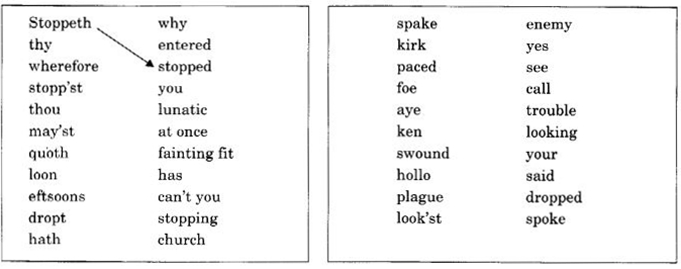
Answer:
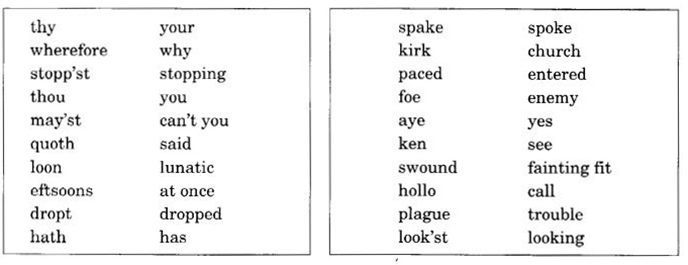
Question 5.
Using the words given above rewrite PART I of the poem in your own words. The first stanza has been done as an example :
It is an ancient Mariner,
And he stoppeth one of three.
‘By thy long grey beard and glittering eye,
Now wherefore stopp’st thou me ?
An old sailor stopped one of the three people passing by, who asked: “Old man, with your long grey beard and glittering eye, why are you stopping me ?”
Answer:
The Wedding-Guest said, “The bridegroom’s doors are opened wide and I am the next member of the family.” He further said, “Can’t you hear the noise as the guests have come and the feast has started ?”
The Ancient Mariner held him with his skinny hand and said, “There was a ship.” At this the Wedding-Guest, calling the Ancient Mariner grey-beard mad person, asked him to unhand him. The latter dropped his hand at once.
The Wedding-Guest stood silent as the Ancient Mariner held him spellbound with his glittering eye. He had no choice but to listen to him like a three years’ child under the Mariner’s will-power.
The Wedding-Guest sat on a stone as he could do nothing except to hear him speak. The Ancient Mariner with bright eyes started narrating his story.
He said that their ship was cheered and cleared of the harbour. They went below the church, the hill and the lighthouse top.
The sun rose from the left out of the sea and shone brightly. It went down into the sea on the right.
The sun went higher and higher every day and stood over the mast at noon. At this the Wedding-Guest started beating his breast. It was because he heard the loud bassoon being played. And his presence there was urgently required.
The bride had entered the hall. She looked as red as a rose. The happy singers and musicians went before her nodding their heads. The Wedding-Guest wanted very much to be there but couldn’t go.
The Wedding-Guest beat his breast as he couldn’t choose anything except to hear the Ancient Mariner. The Ancient Mariner having bright eyes said, “And now there came a severe and strong storm. It struck the ship like a huge animal striking over the victim with his overspread wings and chased us towards south.”
Note : Students can also write on their own the rest of Part I. You can also take help of paraphrase of each stanza given in section II.
Question 6.
Answer the following by choosing the right option from those given below :
(a) The Ancient Mariner stopped one of the three wedding guests because ……….
- he wanted to attend the wedding with him
- he wanted him to sit with him
- he wanted him to listen to his story
- he wanted to stop him from going to the wedding.
(b) The Wedding-Guest remarked that he was ‘next of kin’ which means that
- he was a close relation of the bridegroom
- he was a close relation of the bride
- he was next in line to get married
- he had to stand next to the bridegroom during the wedding.
(c) ‘He cannot choose but hear’ means
- the Mariner was forced to hear the story of the Wedding-Guest
- the Wedding-Guest was forced to hear the story of the Mariner
- the Mariner had the choice of not listening to the story of the Wedding-Guest
- the Wedding-Guest had the choice of not listening to the story of the Mariner.
(d) ‘The sun came up upon the left, / Out of the sea came he ; ‘This line tells us that the’ ship ………
- was moving in the northern direction
- was moving eastwards
- was moving in the western direction
- was moving towards the south.
(e) The Wedding-Guest beat his breast because ……..
- he could hear the sound of the bassoon
- he was forced to listen to the Mariner’s tale when he wanted to attend the wedding !
- the sound of the bassoon meant that the bride had arrived and the wedding ceremony was about to begin and he could not attend it
- the sound of the bassoon announced the arrival of the bride and the start of the wedding ceremony.
(f) The storm blast has been described as being tyrannous because ………
- it was so fierce that it frightened the sailors
- it took complete control of the ship
- the storm was very powerful
- the sailors were at its mercy.
(g) The sailors felt depressed on reaching the land of mist and snow because ……….
- there was no sign of any living creature
- they felt they would die in that cold weather
- they were surrounded by icebergs and there seemed to be no sign of life
- everything was grey in colour and they felt very cold.
(h) The sailors were happy to see the Albatross because …………
- it was the first sign of life and therefore gave them hope that they might survive
- it split the icebergs around the ship and helped the ship move forward
- it was a messenger from God and it lifted the fog and mist.
- it gave them hope of survival by splitting the icebergs.
(i) The two things that happened after the arrival of the albatross were ………
- the icebergs split and the Albatross became friendly with the sailors
- the icebergs split and a strong breeze started blowing
- the ship was pushed out of the land of mist and the ice melted
- the Albatross started playing with the mariners and ate the food they offered.
(j) ‘It perched for vespers nine’ means ……..
- the ship stopped sailing at nine o’clock everyday
- the Albatross would appear at a fixed time everyday
- the Albatross would sit on the sail or the mast everyday
- the Albatross was a holy creature
(k) ‘God save thee, Ancient Mariner, / From the fiends that plague thee thus!—Why look’st thou so ? means ……..
- the Mariner wanted to know why the Wedding-Guest was looking so tormented
- the Wedding-Guest wanted to know why the Mariner was looking so tormented
- the Wedding-Guest wanted to know whether some creatures were troubling the Ancient Mariner
- the Ancient Mariner wanted to know whether something was troubling the Wedding-Guest.
Answer:
(a) → 3. he wanted him to listen to his story
(b) → 1. he was a close relation of the bridegroom
(c) → 2. the Wedding-Guest was forced to hear the story of the Mariner
(d) → 4. was moving towards the south
(e) → 3. the sound of the bassoon meant that the bride had arrived and the wedding ceremony was about to begin and he could not attend it.
(f) → 2. it took complete control of the ship
(g) → 3. they were surrounded by icebergs and there seemed to be no sign of life
(h) → 1. it was the first sign of life and therefore gave them hope that they might survive
(i) → 2. the icebergs split and a strong breeze started blowing
(j) → 3. the Albatross would appear at a fixed time everyday
(k) → 2. the Wedding-Guest wanted to know why the Mariner was looking so tormented.
Question 7.
Answer the following questions briefly.
(a) How did the Ancient Mariner stop the Wedding-Guest ?
(b) Was the Wedding-Guest happy to be stopped ? Give reasons for your answer. (V. Imp.)
(c) Describe the Ancient Mariner. (V. Imp.)
(d) How does the Mariner describe the movement of the ship as it sails away from the land ? (V. Imp.)
(e) What kind of weather did the sailors enjoy at the beginning of their journey ? How has it been expressed in the poem ? (V. Imp.)
(f) How did the sailors reach the land of mist and snow ?
(g) How does the mariner express the fact that the ship was completely surrounded by icebergs ? (V. Imp.)
(h)How do we know that the Albatross was not afraid of the humans ? Why did the sailors hail it in God’s name ?
(i) What was the terrible deed done by the Mariner ?. Why do you think he did it ? (V. Imp.)
Answer:
(a) The Ancient Mariner stopped the Wedding-Guest by his glittering eye and strange appearance. He also caught his hand and looked at him with his bright eyes. These had a kind of magical spell on the Wedding-Guest and he stopped at once.
(b) The Wedding-Guest was not at all happy to stop. He told the Ancient Mariner to let him go as he was the next relation of the bridegroom. His presence was a must at the wedding. Secondly, the guests had come and the feast had started. But when the Ancient Mariner looked at him with his glittering eyes, the Wedding-Guest had no choice but to hear him.
(c) The Ancient Mariner looked very strange and uncommon with his long grey beard and glittering eyes. He had skinny hands, and exotic dress. This made him appear ‘strange and eerie’. The effect of his personality had a kind of magical spell on the Wedding-Guest. He could do nothing except obey the Mariner.
(d) The Mariner describes the movement of the ship thus : the ship was cheered off the harbour merrily. It steered below the church, hill and the lighthouse. After some time, the ship was overpowered by the strong storm. It sailed as if it was being chased by a powerful enemy. Its masts stooped low and the prow dipped.
(e) The sailors enjoyed fair weather in the beginning of their journey : It is not expressly described but can be inferred in ‘Merrily did we drop/below the kirk ….’ The sun shone bright and set into the sea on the right. The weather changed when there came a sea storm. This took over the ship. Then the weather began to get worse and worse.
(f) The sailors reached the land of mist and snow led by the sea storm. It was so tyrannous that it took over the ship and forced it reach the land of mist and snow.
(g) The Mariner describes this fact by stating that the ice came mast high floating by. The ice looked green and was everywhere around the ship. He further states that the ice was everywhere. This ice cracked, growled, roared and howled.
(h) The Albatross was not afraid of the humans as it ate the food that was given to it by them. It came to the ship daily at 9 pm for ‘food and play.’ ‘Food and play’ shows that it was not afraid of them.
The sailors hailed it in God’s name because it was the only living thing over there. The place seemed to have been deserted. The Albatross seemed to be the representative of God over there. It seemed that no other being could survive there.
(i) The terrible thing that the Mariner had done was the killing of the Albatross without any reason. The Mariner did it without any valid reason or any provocation. It seems some instinct in him made him kill it.
Question 8.
There are a number of literary devices used in the poem. Some of them have been listed below. Choose the right ones and write them down in the table as shown in the example. In each of the cases explain what they mean.
simile, metaphor, alliteration, personification, hyperbole, repetition,
|
1. The Wedding-Guest stood still, |
Simile ; the Wedding-Guest was completely under the control of the Mariner |
| 2. Below the kirk, below the hill, Below the lighthouse top |
|
| 3. The sun came up upon the left, Out of the sea came he |
|
| 4. The bride hath paced into the hall, Red as a rose is she |
|
| 5. And now the storm-blast came, and he was tyrannous and strong : |
|
| 6. With sloping masts and dipping prow, As who pursued with yell and blow Still treads the shadow of his foe | |
| 7. The ice was here, the ice was there, The ice was all around |
Answer:
2. alliteration ; repetition of sounds symbolising merriness of the sailors going on the sea journey.
3. personification ; the sun is invested with super human power.
4. simile ; the beauty of the bride is reinforced with it.
5. personification ; symbolising the manly ferocity of the storm-blast investing it with tyranny and brutality.
6. simile ; picturising the efforts of the victim to escape the enemy and the power of the enemy.
7. alliteration ; to create music and its sweetness.
Question 9.
In groups of four discuss what you think happens next in the poem. Share your views with the rest of the class.
Answer:
Activity at classroom level. One group discussion is given below :
A : I think the Ancient Mariner and the sailors are now trapped in this land of ice. They will soon die there.
B : I disagree with it as you can’t predict anything. But even if you predict, it is quite possible that some Godly help may reach them.
C : It may be that they themselves do something to help themselves. It may be that the weather changes soon and the ship steers clear of this land.
D : It may also be possible that some Polar Spirit may be avenging them for having killed the innocent Albatross in the beginning. Quite possibly, they repent over it. Due to this the spirit relents and they save themselves from further troubles.
A : I beg to disagree with it as I don’t believe in spirits or supernatural occurrences.
B : I disagree with A. There are all the things though we have hardly any knowledge about them. Shakespeare wrote his plays around 400 years back. He describes ghosts and spirits in them. It means they existed then also. Or people believed in them. Even today they are a part of our folklore.
D : I think the Ancient Mariner does something after suffering a lot which amounts to his expiation. Later, the Polar Spirit relents and forgives him. However, he is left t narrating his tale of woe when the supernatural soft of guilt gets heavy on him. And it lessens when he relates his story. When he does so, his guilt gets washed off to some extent.
C : I find it hard to believe but it seems a little bit convincing.
D : I think it is all about this chain of thought.
Question 10.
The teacher will now read out the second part of the poem or assign parts to you and ask you to read the poem to the class.
Answer:
For students to read on their own.
Question 11.
Answer the following questions briefly :
(a) In which direction did the ship start moving ? How can you say ?
(b) Why does the Mariner say that ‘no sweet bird did follow’ ?
(c) How did the other Mariners behave towards the Ancient Mariner at first ? How many times did they change their mind about the Ancient Mariner ? What does this tell us about their character ? (V. Imp.)
(d) How did the sailing conditions change after the ship had moved out of the land of mist and snow ? What or who did the Mariners blame for this change ? (V. Imp.)
(e) What is indicated by the line ‘The bloody sun, at noon,/Right up above the mast did stand,/No bigger than the moon’ ?
(f) How does the Mariner describe the fact that they were completely motionless in the middle of the sea ? (V. Imp.)
(g) What is the irony in the ninth stanza ? Explain it in your own words.
(h) What is the narrator trying to convey through the description of the situation in the tenth and eleventh stanza ?
(i) What or who did the Mariners feel was responsible for their suffering ? (V. Imp.)
(j) Describe the condition of the Mariners as expressed in the thirteenth stanza.
(k) Why did the Mariners hang the Albatross around the neck of the Ancient Mariner ? (CBSE 2012) (V. Imp.)
Answer:
(a) The ship moved to the south after the sea storm enveloped it. It took over the ship like a fierce enemy who chases its victim. This is clear from the directions the sun set. In the beginning when the ship sailed, the sun came from the left and set on their right.
Now the sun rose from the right and set in the left direction of the ship. It is clear in the stanza starting with ‘The Sun now rose … into the sea’.
(b) The Mariner says this with utter sadness after the Albatross has been killed by him. Secondly, the place is all ice and snow. There is hardly any possibility of any living being there in such an inclement weather.
(c) At first the sailors criticized the Mariner for killing the Albatross that made the breeze blow. When the sun rose gloriously after some time, the mariners said that the killing of the Albatross was right. It was good, they said, because the bird had brought fog and mist. The sailors thus behaved differently with the Mariner.
But they changed their minds two times. This shows that they had shallow and fickle minds and didn’t have integrity or sense of propriety.
(d) Now the ship went to the north direction as the sun rose from the right. The good south wind still blew behind. The breeze that blew was fair with white foam flowing on the watery surface of the sea. The ship left the furrow free behind it. There was complete silence. But soon the breeze got very hot.
The mariners changed their statement and blamed the killing of the Albatross by the Mariner for this change.
(e) By this line there is a clear cut indication that some ominous thing was going to happen. The weather was becoming very inhospitable and very unbearable due to heat. So anything could happen that could endanger the lives of the sailors.
(f) The Mariner describes this fact by using the metaphor of the painted ship on a painted ocean. As the painting can’t move, so were the sailors and the Mariner.
(g) The irony in the 9th stanza is very clear. There was water and water everywhere. Yet there was no water to drink. Secondly, even though there was water everywhere the boards shrank due to intense heat.
(h) In the tenth and eleventh stanzas the narrator is trying to convey a natural scene of the sea. Secondly, he is trying to convey the supernatural aspect of nature almost ironically. The sea was rotting, yet the slimy things were crawling with legs on the slimy sea (stanza 10). This is to convey the supernatural occurrence. In stanza 11, death-fires danced at night like a witch’s oils burning green, blue and white. This, again, amounts to supernatural aspect.
(i) The mariners felt that the Ancient Mariner was solely responsible for their suffering.
(j) The condition of the mariners was simply pathetic. Their tongues were withered at the roots and parched fully. Due to that they couldn’t speak. They felt as if their throats had been choked with soot. They were acutely suffering.
(k) The mariners hung the dead Albatross around the neck of the Ancient Mariner out of a sense of revenge. They considered him solely responsible for their bad plight. Due to that they punished him by hanging it around his neck.
Question 12.
Like part one, the second part also has a number of literary devices. List them out in the same way as you had done in question number seven and explain them.
Answer:
|
1. The fair breeze blew, the white foam flew, |
alliteration ; to create music in words |
| 2. All in a hot and copper sky The bloody sun, at noon | metaphor ; to invest the sky and sun the power of the elements to kill anything |
| 3. As idle as a painted ship | simile ; to convey the exactness of the imagery |
| 4. water, water every where, water, water, every where | repetition ; to convey the immensity of the water all around |
| 5. Nine fathom deep he had followed us from the land of mist and snow | personification; the spirit is not a spirit but a Human Being having super powers ; to convey the earthly reality. |
| 6. The death-fires danced at night; the water, like a witch’s oils, burnt green, and blue and white. | hyperbole; to convey the immensity and wonder of supernatural elements to a human condition. |
Question 13.
What is the rhyme scheme of the poem ?
Answer:
The rhyme scheme of ‘The Rime of the Ancient Mariner’ is abcb. However, in stanzas of six lines, it is either aba bcb, a aa bcb or ababcb. Students can know it by putting ABC etc to the last syllable of each line in a stanza. For example, in stanza of (‘The Sun came up upon the left… sea’) we put a after ‘left’ in the first line. In the second line we put b after ‘he’ because left’ ends with /t/sound and ‘he’ ends with /ee/. In the third line, we put c after ‘right’. It is because ‘left’ and ‘right’ don’t have similar sounds. However, they have /t/ sound at the end. In the fourth line we put b after ‘sea’ because ‘he’ and ‘sea’ are pronounced similar. Thus the rhyme scheme of this stanza would be : a b c b. Students can themselves find out the rhyme scheme of different stanzas in this poem and in others as well.
Question 14.
Find examples of the use of interesting sounds from the poem and explain their effect on the reader.

Answer:
|
1. ‘And now the STORM-BLAST came, and he was tyrannous and strong : |
The use of onomatopoeic word ‘storm- blast’ and personifying it gives the idea of brutality and tyranny. One gathers the idea that the storm will blast everything to pieces. |
|
2. The ice was here, the ice was there, the ice was all around : |
The repetitive sound of ‘ice’ reinforces the idea of immensity of ice and its power to freeze everything to death. |
|
3. Then all averred, I had killed the bird. |
The use of internal rhyme creates a music of its own sweetening thus the effect of the meaning. |
|
4. The fair breeze blew, the white foam flew, the furrow followed free ; |
The repetition (alliteration) creates music and at the same time gives out an idea of freedom of the ship from the clutches of cold. The cold is symbolised by ice, mist, snow etc. |
|
5. About, about, in reel and rout the death-fires danced at night; the water, like a witch’s oils, burnt green, and blue and white. |
Internal rhythm, repetition, alliteration, all combined together, create a fine picture in the mind. These heighten the effect of the supernatural aspect of the poem. |
Note : Students on their own can find out more such uses and feel the effects in their minds created by them.
Question 15.
The poem is full of strange, uncanny or supernatural elements. Discuss how these elements appear in the poem. You should consider :
— the strange weather ;
— the albatross as a bird of “good omen”
— the spirit from “the land of mist and snow”
— the strange slimy creatures seen in the sea
— the ocean appearing to rot
— the death fires and sea water being referred to as witch’s oils
Now write a paragraph about the supernatural elements in the poem and how they add to the events that take place in the poem.
Answer:
The poem has supernatural elements in plenty. First of all, there is the strange kind of the subject matter. And then the appearance of the Ancient Mariner stopping the r Wedding-Guest. His skinny hands, grey beard and glittering eyes describe him as a soul tormented still by some supernatural power.
The sudden change in weather also reinforces this idea. When the ship commences its journey it is the fine weather. But the storm-blast takes it to the south pole. There it faces the strange and weird kind of weather. The mast high ice and ice-bergs giving out a strange destructive sound cause dread in our hearts. The Albatross’s appearance before | the mariners is a God-send. It is a bird of‘good omen’ as it clears the way for them from the land of miseries. However, the mariner kills it making its protective Polar Spirit angry. The Mariner must suffer and he suffers as other mariners also suffer. Their suffering due to cold and next due to heat is simply heart-rending. They have water all around them but they can’t quench their thirst.
Their sufferings are simply unnatural but reinforcing a belief in the supernatural agency. The rotting water of the sea with death fires burns and gives out different colours. It is equally terrifying and fearful to see it. This reminds one of witches performing an evil ritual (as in Shakespeare’s Macbeth).
All these things create a supernatural effect on the readers.
Question 16.
Every ship is supposed to have a log book, which is filled in every day by the captain. If he dies, the next senior officer fills it in (usually the First Mate). Decide on appropriate dates (the mariner’s tale was supposed to be thought of as already very old when the poem was published : it should be no later than about 1700 AD; other clues to the date are the light-house and the mariner’s crossbow). If you wish you can make the log look old by staining the pages, by your handwriting and spelling. Write a series of entriesfor the log for the important events that take place in the ship as recorded in the poem. The first one has been done as an example.
1701 AD
Today we left the shore at 3.30 p.m. under glorious sailing conditions. We have 230 men on board. We are sailing with cargo towards Portugal. The journey is expected to take 90 days. We are well stocked with food and water to last us 250 days in case of any emergency. Hopefully we will not face any untoward i happenings. God be with us !
You could also do this as an oral activity, recording the entries on audio tape and using voice effects and other sound effects if you can.
Answer:
Mainly classroom activity. We are giving two log book entries. Students can write a few more on their own taking hints from these.
1701 AD
Today after around 15 days when we started sailing, the weather has become very rough and most inhospitable. A sea storm has come over us with great fury. It is tyrannous and strong. It is affecting the ship like it is going to take full control over it. It is pursuing like a powerful enemy chasing another. That’s why, the ship’s prow is dipping and its masts have slopped. It seems it is going to tear the ship apart . taking it towards south. This all is causing us a great worry.
1701 AD
After 3 days when the wild and violent sea storm ‘attacked the ship, we have somehow managed to keep it floating. But another horrible situation has cropped up. The ship is now in a land having ice all round and nothing else. The ice is mast-high. It comes floating and is looking green as emerald. The ice drifts and snowy clifts, that is, icebergs send out a dismal brightness. There is no living being worth the mention all around. I dread thinking what horrible place it is ! The mariners have not lost hope, though they are greatly terrified.
Question 17.
Performing the poem
Answer:
Mainly meant for performing various dramatic events at classroom level.
Question 18.
The poem has seven parts to it.
Answer:
Students to proceed as per the directions given above.
Question 19.
In your groups discuss the following :
(i) Why did the Ancient Mariner stop the particular Wedding-Guest to listen to his tale ?
(ii) Why did he have to tell his tale to someone ?
(iii) What is the poet trying to convey through this poem ?
Answer:
Classroom activity. Students may take some help in their discussion from the ideas given below :
(i) The Ancient Mariner stopped the particular Wedding-Guest to listen to his tale as he felt that the Wedding-Guest would listen to him. Secondly, the fit of narrating his story was on him. It was all supernatural. It seemed that if he didn’t relate his story of repentance and guilt, he won’t feel any relief.
(ii) He had to tell his tale of guilt and suffering to someone. This curse of the Polar Spirit protecting the Albatross was on him. Since he had appreciated the slimy creatures, he had indirectly shown his love for God’s creatures. His love for these creatures had softened the heart of the Polar Spirit. Thereby he had earned a kind of reprieve from his guilt and sin of killing the innocent Albatross.
But he could get this relief only when he had narrated his story when the fit was on him. And he had to relate his story at once to anyone.
(iii) The poet is trying to convey the idea that God loves all his creatures whether they are big or small, beautiful or ugly. No one has the right to kill any animal. The Mariner has killed the Albatross without any cause. In that he has broken the dictates of God. So he must suffer. So he suffers. This is that he will be free from the tormenting fit only after narrating his story of sea journey. And he does it.
So the message is loud and clear. We must love all creatures irrespective of their class, category, appearance etc.
We hope the NCERT Solutions for Class 10 English Literature Chapter 11 The Rime of the Ancient Mariner help you. If you have any query regarding NCERT Solutions for Class 10 English Literature Chapter 11 The Rime of the Ancient Mariner, Nor the Gilded Monuments, drop a comment below and we will get back to you at the earliest.
